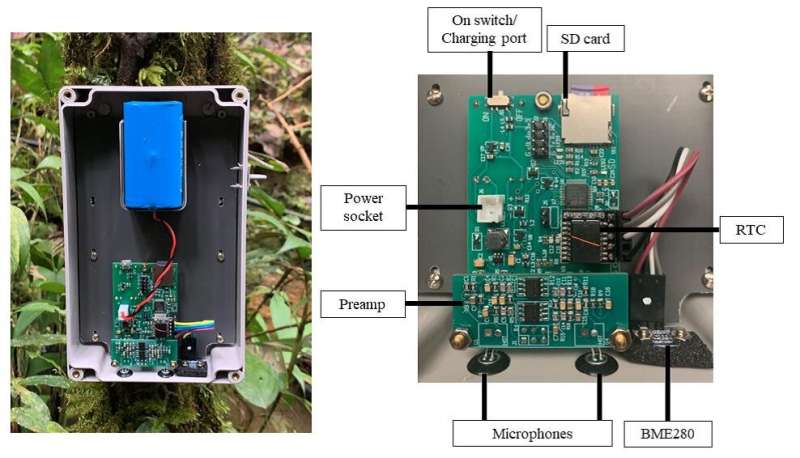
In a study published in Methods in Ecology & Evolution, researchers from the Xishuangbanna Tropical Botanical Garden (XTBG) of the Chinese Academy of Sciences and their collaborators developed a new acoustic recorder which enables long-term monitoring of both bioacoustics and abiotic factors to enable more detailed bioacoustic monitoring, especially in tropical or wet conditions.
New low-cost options for long-term acoustic monitoring in terrestrial ecology are becoming increasingly available. However, integration of acoustic stations with sensors for logging of additional data, such as temperature and barometric pressure, is rare.
Here, the researchers presented a hardware system for both acoustic and environmental data logging where the board design is released under a creative commons license. The system was developed by Stand Up Labs in Singapore and was deployed for field tests in Kinabalu Park, Sabah, Malaysia. It is called the Kinabalu Recorder.
The system has gone through extensive field tests in the tropics on an altitudinal gradient. It recorded acoustic data at 44.1 kHz as well as temperature and barometric pressure for 30 days per rotation. It is highly portable, at a weight of about 650 grams, including a weather-proof box and a 3.7 V 8,000 mAh lithium-ion battery.
The researchers showed that the Kinabalu Recorder is robust, lasting long periods of time in the field under difficult tropical field conditions. “It is easy to use allowing for scalability as local field staff even with low technical background can easily perform data retrieval in the field,” said Catharina Karlsson of XTBG.
The Kinabalu Recorder came at a cost of less than 100 dollars per station. It is an assembly of boards, temperature and barometric sensor, two batteries, water-proof housing and two 64 GB micro SD cards.
“The system has the capacity to enable long-term use in the field, making it a viable and affordable method for long-term biomonitoring studies,” said Catharina Karlsson.